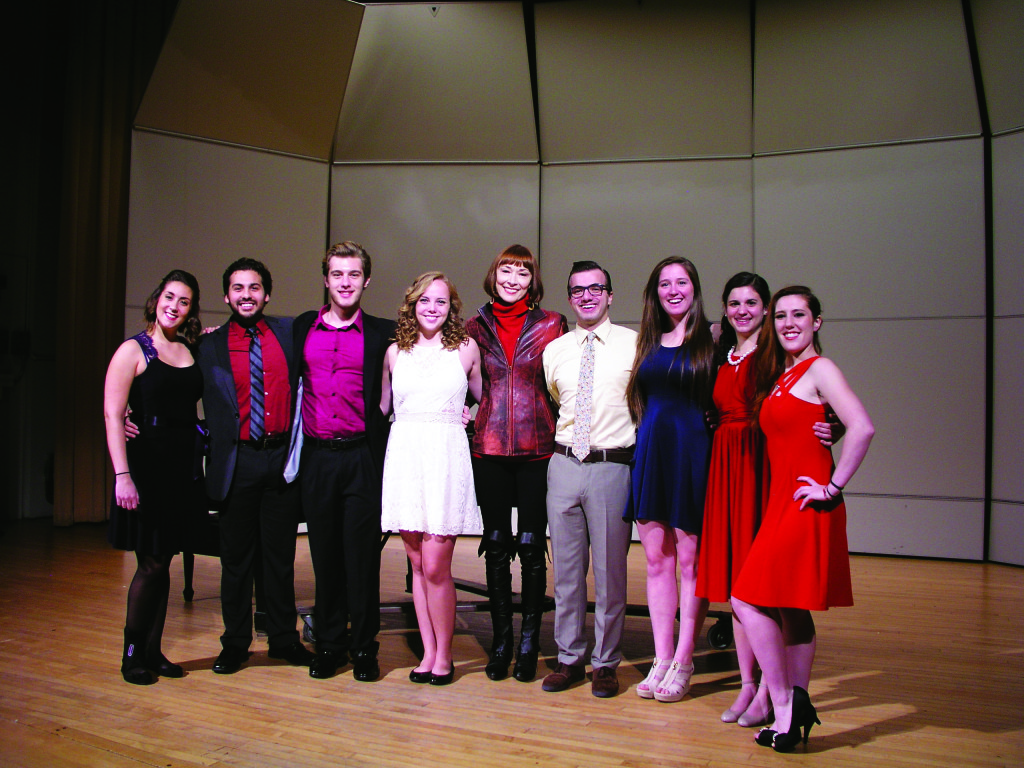HOLLY BURDICK
Special to The Leader
“What if” — two words that can imply many things. “What if” — two words that permit the imagination to run wild. “What if” — two words that Tony Award-nominated, Karen Akers used many times to explain what she wanted to teach. “What if,” Akers tells us, “are the two words that make the magic.”
Karen Akers has performed not only in the United States, but also Europe and the former Soviet Union. She has created an amazing name for herself, and her career is just as great.
Akers played Raffaela in the Tony Award-winning show “Grand Hotel” and received the nomination for her performance as Luisa Contini in “Nine,” both directed by Tommy Tune. Akers has two of her own PBS television specials and PBS musical tributes under her belt. She has also performed at the White House, not once, not twice but three times. And if that is not enough, Akers has multiple film experiences.
Theater students, chosen through an audition, were given the opportunity to perform a solo for Akers. They were able to perform a song of their choice before Akers and an audience of staff and peers. Kevin Stevens, Anna Chicco, David Rivera, Micayla Greco, Jacob Badding, Melita Kingston and alternates Maggie Austin and Michaela Tramuta were the lucky and brave eight students.
The audience was carried on a crazy journey that had it all. Different characters were met, each with different emotions and stories to tell. Each time a theater student had to portray a character, he or she needed to become that character. The students’ job was to make the audience believe who they are, not who they are trying to depict.
Each student represented who they wanted to be, what their story was and what they felt. They showed what the song meant to them. When the performances were complete, Akers gave any corrections that she saw fit along with the two magic words mentioned earlier: what if? Akers changed the scene, set a new tone and gave a new scenario that the characters needed to adapt to. It clicked with each and every student.
Every single time, sometimes with help, those present witnessed an incredible transformation. The song changed, the meaning changed, everything changed. Akers knew there would be a change, and she frequently turned toward the audience to make sure students felt the same thing she did.
During her times of corrections and guidance, she said two things that stood out. She said that each time one goes on stage it is “less of a performance and more of an experience.” Actors turn into these characters and are sharing how they feel and telling the audience their story. Akers also quoted well-known cellist Yo-Yo Ma: “It’s never, ever about proving something. It’s about sharing something.”
The performers were accompanied by James Welch. The pianist has plenty of experience and is very fit for the job. Welch is a second prize winner in the Bradshaw and Buono International Piano Competition in New York, and he has performed at many events in the United States. He has degrees from Fredonia and East Carolina University.
Welch is currently part of the music faculty at Fredonia. After getting the chance to talk to him after the show, he said that nerves were not an issue for him at all. He was very impressed with the turnout and found it difficult to put into the words the magic that Akers created with the students. He felt the magic himself and was just as surprised and amazed as the audience.
After the students performed, Akers gave a performance of her own. She blew everyone away with her emotion and power behind the song she shared, which was “Stars and the Moon” from ‘Songs for a New World.’ She created a whole new identity, and it was not the woman laughing and making jokes with her personal accompanist, Don Rebic, mere seconds before. Final questions were answered, and personal stories were shared at the conclusion of the event.
“Singing is communication,” Akers said. That was the lesson she taught. What if this happens? What if that happens? Either way, it needs to be communicated. The whole idea behind this event was to learn how to change, to portray different things and to communicate different messages to an audience who just wants to believe.

